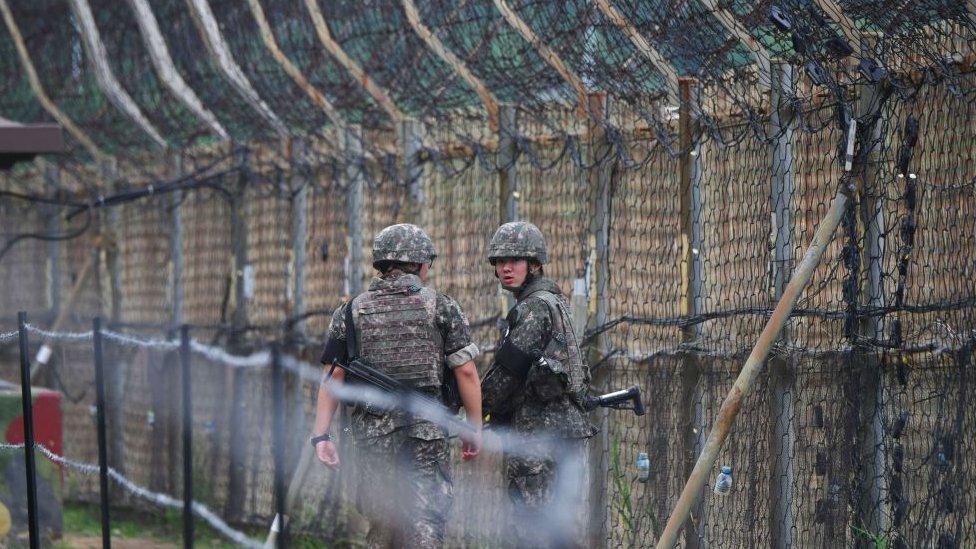North Korean man caught by South after crossing border
- Published

South Korean troops tracked the man for three hours
A North Korean man who was caught on the South Korean side of the heavily-fortified border on Tuesday is suspected to have swum his way there.
The man, in his 20s, was wearing a diving suit and a set of fins when he was stopped in the de-militarized zone (DMZ), South Korea said.
He is thought to be seeking to defect from the North to the South.
It is rare for people to defect via the DMZ although a similar incident occurred last November.
The man was located at the eastern zone of the DMZ at 04:20 on Tuesday (19:20 GMT on Monday), near the coastal town of Goseong, South Korean officials said.
He was tracked for three hours as he made his way through the heavily-militarised zone before being picked up by South Korean soldiers.
It is not yet clear if he is a civilian or a member of the military.
"He is presumed to be a North Korean and we're conducting an investigation into details, including how he had come down and whether he wished to defect," the Joint Chief of Staffs said in a statement on Tuesday
It added that it would be investigating the security breach.
The man is thought to have avoided the lines of barbed wire fencing along the beach by crawling through a drainage tunnel, which was not properly protected.
A former gymnast defected via the DMZ last November by jumping over the border fence.
According to South Korean media, authorities had the young North Korean jump several times to verify his story of how he crossed the border.
An investigation found that a loosened screw in border sensors allowed the defector to cross undetected. South Korea's border sensor system is supposed to alert guards if there is some impact on the fence.
Following the investigation, South Korea's military announced it would check every sensor at the inter-Korean border.
North Korea defectors: Why it's getting harder to escape
Since taking power in 2011, North Korean leader Kim Jong-un is believed to have have ordered the tightening of border controls between the two sides and with China, including by laying more landmines.
But about 1,000 people defect from North Korea each year, fleeing a repressive state that has faced numerous accusations of human rights abuses.
Most North Koreans escape by crossing over the border to China from where they risk being sent back to the North.
Crossing via the DMZ is dangerous. If spotted and arrested by the North Korean military, those trying to cross would certainly be taken to a detention centre to be interrogated. They could be tried and sentenced to lengthy terms in labour camps.
The border and its fortifications have been in place since the Korean War ended in an armistice in 1953. North and South Korea remain technically at war as the fighting did not end with a peace treaty.
- Published25 January 2021

- Published26 November 2020

- Published16 April 2020
